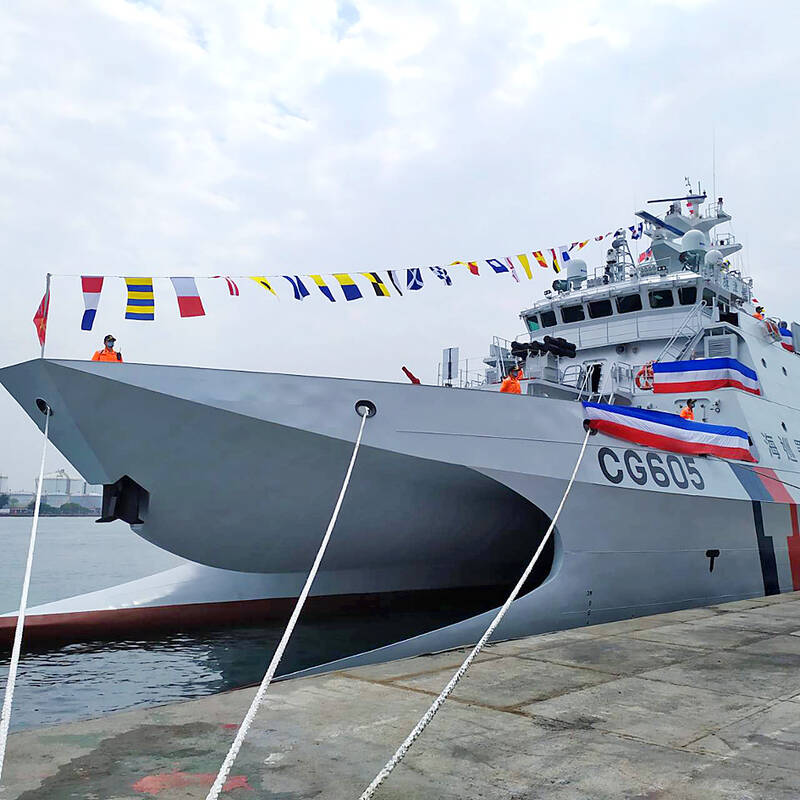The Ministry of National Defense has allocated NT$3.2 billion (US$104.04 million) to upgrade the radio equipment of more than 100 coast guard ships and boats from this year through 2026, a source familiar with the matter said, speaking on condition of anonymity.
The allocation is part of a special budget of the Sea-Air Combat Power Improvement Plan, which allows the government to spend more than NT$240 billion on military programs.
The Chunghsan Institute of Science and Technology — which is responsible for obtaining radios for coast guard vessels — has called three conferences with potential contractors, the source said yesterday, adding that it expects to award the project in August.

Photo: Hung Ting-hung, Taipei Times.
The institute’s solicitation included 124 self-designed CS/PRC-37C manpack radios, 130 shipborne mobile radio base stations, equipment for two network operations centers, 10 repeaters and six dispatch counsels, they said, citing information disclosed to the private sector.
Although local media previously reported that the budget would only cover 12 Anping-class offshore patrol vessels, all 35-tonne-class boats and larger vessels would receive the upgrades, the source said.
More than 100 of the coast guard’s 185 ships would receive them, they said.
The Hai Wei Project is under the sole control of the defense ministry under Article 4 of the National Defense Act (國防法), which gives it the authority to manage and direct the Coast Guard Administration (CGA) if it is mobilized for national defense, they said.
The Anping-class vessels are the coast guard’s version of the navy’s 600-tonne Tuo Chiang-class corvettes, which can be refitted with Hsiung Feng II and Hsiung Feng III cruise missiles, they said.
If war breaks out, the coast guard would be incorporated into the navy’s Task Force 62 under the armed forces’ regulations governing the defense of Taiwan proper and Penghu County, the source said.
A separate source said that a Taiwan-US coast guard partnership continues to emphasize disaster response and maritime law enforcement, despite Taipei’s ambitions to transform its coast guard into a second navy.
Meanwhile, Institute for National Defense and Security Research analyst Shu Hsiao-huang (舒孝煌) said the CGA should lobby to be invited to the US-led Rim of the Pacific exercises, as it would allow the coast guard to broaden its participation in Indo-Pacific security matters through its relationship with the US Coast Guard, which regularly plays a significant part in the drills.
Additional reporting by Wu Su-wei

‘CORRECT IDENTIFICATION’: Beginning in May, Taiwanese married to Japanese can register their home country as Taiwan in their spouse’s family record, ‘Nikkei Asia’ said The government yesterday thanked Japan for revising rules that would allow Taiwanese nationals married to Japanese citizens to list their home country as “Taiwan” in the official family record database. At present, Taiwanese have to select “China.” Minister of Foreign Affairs Lin Chia-lung (林佳龍) said the new rule, set to be implemented in May, would now “correctly” identify Taiwanese in Japan and help protect their rights, the Ministry of Foreign Affairs said in a statement. The statement was released after Nikkei Asia reported the new policy earlier yesterday. The name and nationality of a non-Japanese person marrying a Japanese national is added to the

AT RISK: The council reiterated that people should seriously consider the necessity of visiting China, after Beijing passed 22 guidelines to punish ‘die-hard’ separatists The Mainland Affairs Council (MAC) has since Jan. 1 last year received 65 petitions regarding Taiwanese who were interrogated or detained in China, MAC Minister Chiu Chui-cheng (邱垂正) said yesterday. Fifty-two either went missing or had their personal freedoms restricted, with some put in criminal detention, while 13 were interrogated and temporarily detained, he said in a radio interview. On June 21 last year, China announced 22 guidelines to punish “die-hard Taiwanese independence separatists,” allowing Chinese courts to try people in absentia. The guidelines are uncivilized and inhumane, allowing Beijing to seize assets and issue the death penalty, with no regard for potential

‘UNITED FRONT’ FRONTS: Barring contact with Huaqiao and Jinan universities is needed to stop China targeting Taiwanese students, the education minister said Taiwan has blacklisted two Chinese universities from conducting academic exchange programs in the nation after reports that the institutes are arms of Beijing’s United Front Work Department, Minister of Education Cheng Ying-yao (鄭英耀) said in an exclusive interview with the Chinese-language Liberty Times (the Taipei Times’ sister paper) published yesterday. China’s Huaqiao University in Xiamen and Quanzhou, as well as Jinan University in Guangzhou, which have 600 and 1,500 Taiwanese on their rolls respectively, are under direct control of the Chinese government’s political warfare branch, Cheng said, citing reports by national security officials. A comprehensive ban on Taiwanese institutions collaborating or

STILL COMMITTED: The US opposes any forced change to the ‘status quo’ in the Strait, but also does not seek conflict, US Secretary of State Marco Rubio said US President Donald Trump’s administration released US$5.3 billion in previously frozen foreign aid, including US$870 million in security exemptions for programs in Taiwan, a list of exemptions reviewed by Reuters showed. Trump ordered a 90-day pause on foreign aid shortly after taking office on Jan. 20, halting funding for everything from programs that fight starvation and deadly diseases to providing shelters for millions of displaced people across the globe. US Secretary of State Marco Rubio, who has said that all foreign assistance must align with Trump’s “America First” priorities, issued waivers late last month on military aid to Israel and Egypt, the